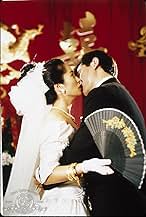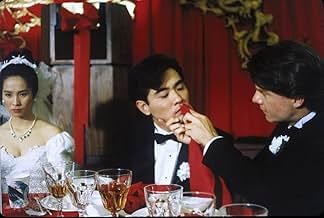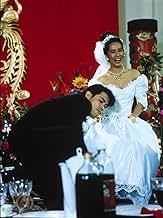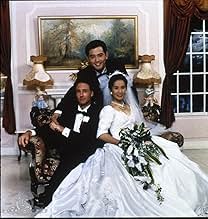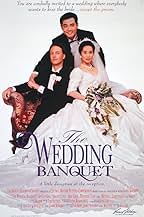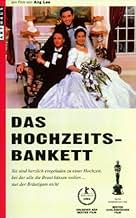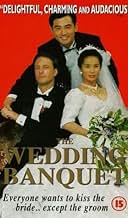Per soddisfare i suoi fastidiosi genitori, un padrone di casa gay e la sua inquilina celebrano un matrimonio di convenienza, ma i suoi genitori vengono a trovarlo e le cose sfuggono di mano.Per soddisfare i suoi fastidiosi genitori, un padrone di casa gay e la sua inquilina celebrano un matrimonio di convenienza, ma i suoi genitori vengono a trovarlo e le cose sfuggono di mano.Per soddisfare i suoi fastidiosi genitori, un padrone di casa gay e la sua inquilina celebrano un matrimonio di convenienza, ma i suoi genitori vengono a trovarlo e le cose sfuggono di mano.
- Regia
- Sceneggiatura
- Star
- Candidato a 1 Oscar
- 13 vittorie e 11 candidature totali
- Mrs. Gao
- (as Ah-Leh Gua)
Recensioni in evidenza
IMDb lists this film as comedy. There are comedic scenes such as the post wedding party. Yes, the party is hardly an exaggeration, it is actually done according to the Chinese culture! However, I think The Wedding banquet is better be viewed as a drama. The plot of this film is probably the life story of many gay men of Chinese descent. It is simple, and yet truthful, realistic, touching and affecting.
The main character, Wai-Tung, faces enormous pressure to get married. However, he is actually in love with a Westerner called Andrew. The film fully portrays the pressure Wai-Tung faces because of parental and societal pressure. It also displays how preaches acceptance and tolerance. The ending is so touching, and even months after watching the film, I can still remember the ending.
This is an excellent film. For men who are in situations similar to Wai-Tung, The Wedding Banquet will resonate with them forever. Even if you are not in a similar situation, this film is so touching that it is a must watch!
Wai-tung (Winston Chao) is a gay Taiwanese landlord in New York with his boyfriend Simon (Mitchell Liechtenstein). Having not admitted his sexual orientation to his parents, he is pressured by them (and tradition) to get married and to have son to carry the Gao name. Meanwhile, Wei-wei (May Chin) is on the edge of poverty. An Chinese artist living in one of Wai-tung's derelict buildings, she is looking for a green card to avoid deportation. Noticing both situations, Simon suggests they marry out of convenience, but things go wrong when Wai-tung's parents come over to New York and a wedding banquet is held.
Although such a story today would have been regarded as a ordinary for a film plot, Lee's vision at the time it was made was fairly radical for certain sections of society at the time, particularly in conservative Taiwan. Lee pushed the boundaries, even including the first gay kiss scene to appear on Taiwan's screens.
Despite the ground-breaking story and the fact that I am watching it almost 12 years after it was made, I didn't feel that there was a sense of believability in the first half of the film. Characters were very 2D and lacked depth. There was a lot of missing chemistry on-screen, and for most of the first half, I did admit I was a little bored. The second half after the banquet takes place, though, was much better. As the characters are exposed and plots unfold, the story becomes more interesting and was much easier to watch.
However, one other gripe is the fact that the humour doesn't quite make its mark in the movie. There are plenty of opportunities to add the little smiles on peoples' faces, but the attempts to do so were fairly weak. The only time I let out a chuckle was in the City Hall wedding ceremony. Simply put, it doesn't match Ang's third film, Eat Drink Man Woman, in this respect.
Overall though, this is a watchable film, and you can easily see that Lee has developed his techniques quite a long way since his early films. The Wedding Banquet certainly demonstrates why people had faith in him and recognised his talent in the early days. One for a look back.
I recommend it highly.
Ang Lee is one of the best film directors working these days. This is a small film in comparison to what came afterward. The story of how parents in a conservative society view their children that are "different" is always an interesting idea. Those same parents produced that child; the mere idea they will turn their backs to a son who is living openly as a gay man is a complex problem, at best.
Different cultures react differently, as is the case in this film. While the parents are not completely taken over by the way they discover their son has turned out to be, they go along with the flow, never condemning the son, his partner, or the young woman who is pretending to be, what she is not.
The acting is good in general, but it has to be the actor who plays the father, who ultimately wins one's heart. His culture goes back for centuries and he is won by his son's lover because he sees how kind, decent and honest he really is.
It's better never to judge, or so it seems that Ang Lee is telling us.
And while I found the ending of this movie somewhat unrealistic (I'll let other viewers decide) I also found the film challenging and optimistic (which is where my realism takes over).
You should watch this movie if you are Asian gay Asian AND gay or simply want to learn something about another culture. You might be surprised!
Props to Ang Lee for creating a unique opportunity to look into two very distinct and different cultures at the same time: Asian American and gays in the early 90s.
Lo sapevi?
- QuizIl banchetto di nozze (1993) has the highest cost-to-return ratio of 1993, earning $23.6 million from a budget of $1 million. This gave it a of 23.6 ratio, considerably higher than 1993's biggest money-maker "Jurassic Park" whose ratio was 13.8.
- BlooperDuring the small family dinner to which Simon treats the newlyweds and Wei-Tung's parents, Simon can be seen to alternately hold chopsticks, a small bowl or nothing in his left hand, depending on the camera angle.
- Citazioni
Justice of the Peace: Okay, now you: "I, Wee-Wee..."
Wei-Wei: Wee-Wee.
Justice of the Peace: "... take you, Wai Tung..."
Wei-Wei: Wee-Wee.
Justice of the Peace: Okay. "To be my wedded husband... to have and to hold..."
Wei-Wei: Holding to have, husband, mine...
Justice of the Peace: "... for better, for worse, for richer, for poorer..."
Wei-Wei: Better and richer, no poorer.
Justice of the Peace: "... in sickness and in health, till death do us part."
Wei-Wei: Till sickness and death.
Justice of the Peace: Groovy. Rings.
- Versioni alternativeRemade as the English language version "The Wedding Banquet" (2025), with James Schamus co-writer on both.
- Colonne sonoreThe Wedding Banquet
I più visti
- How long is The Wedding Banquet?Powered by Alexa
Dettagli
- Data di uscita
- Paesi di origine
- Lingue
- Celebre anche come
- El banquete de boda
- Luoghi delle riprese
- Aziende produttrici
- Vedi altri crediti dell’azienda su IMDbPro
Botteghino
- Budget
- 1.000.000 USD (previsto)
- Lordo Stati Uniti e Canada
- 6.933.459 USD
- Fine settimana di apertura Stati Uniti e Canada
- 134.870 USD
- 8 ago 1993
- Lordo in tutto il mondo
- 6.933.459 USD
- Tempo di esecuzione
- 1h 46min(106 min)
- Colore
- Proporzioni
- 1.85 : 1



